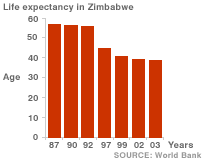 The people of the country once known as the bread basket of central Africa are now starving as their nation sinks into poverty. According to the Catholic News Service, more people are dying from starvation and disease in Zimbabwe under President Robert Mugabe than are killed in the war in Iraq or the conflict in Darfur. The article reports that the mortality rate in Zimbabwe is a thousand per week higher than the Darfur region of western Sudan.
The people of the country once known as the bread basket of central Africa are now starving as their nation sinks into poverty. According to the Catholic News Service, more people are dying from starvation and disease in Zimbabwe under President Robert Mugabe than are killed in the war in Iraq or the conflict in Darfur. The article reports that the mortality rate in Zimbabwe is a thousand per week higher than the Darfur region of western Sudan.Jimmy Moyana reports for the Institute for War and Peace that people are now eating pet food as a meat substitute:
Beef and pork now cost between 4,000 and 6,000 Zimbabwean dollars (16 to 24 US dollars) a kilogram in the supermarkets. A family of six which would have consumed 12 kilos of meat a month in the days before Zimbabwe's economic implosion began would now need to spend 72,000 Zimbabwean dollars (288 US dollars).
Eighty per cent of the population is unemployed and the majority of people in work earn less than 20,000 Zimbabwean dollars a month.
People buy pet food even though the packaging clearly states that it is not for human consumption. A 500-gram packet of branded pet food costs around 1,250 Zimbabwean dollars - five US dollars - and a kilo of "meat sawdust" which contains meat gristle and bone and is sold as dog meat by abattoirs costs 1,200 Zimbabwean dollars.
Those who cannot afford pet food have to be content with flavouring boiled rape leaves with animal fat cut from beef or pork.
Dignity is a luxury few can afford these days in a country which until seven years ago was the breadbasket of southern Africa. At Colcom Foods in Harare's Willowvale area, there are long queues at the department where pet food is sold.
Meanwhile, the BBC reports the country suffers from an unemployment rate of 80% and is burdened with the world’s highest rate of inflation – more than 1,000%. The International Monetary Fund is reviewing its options with the African country’s debt of to the IMF of $125 million. According to the article, government borrowing has forced the central bank to print more money to prop up the economy.
The government of Robert Mugabe has held power since 1980.
No comments:
Post a Comment